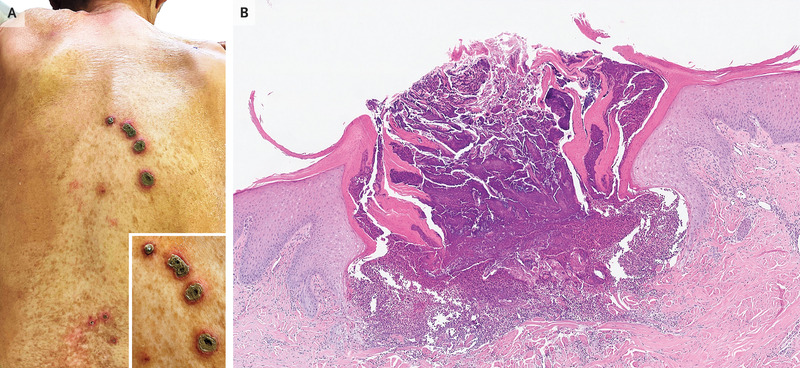A Dermatological Manifestation of Systemic Conditions

An 83-year-old woman with a history of type 2 diabetes mellitus presented with an itchy rash on her back, leading to a diagnosis of acquired reactive perforating collagenosis. This case underscores the importance of recognizing dermatological symptoms as potential indicators of underlying systemic conditions.
Key Points:
- The patient had a 4-month history of an itchy rash on her back.
- Her glycated hemoglobin value had been 8.5% a year before presentation.
- Physical examination revealed a linear array of crateriform lesions on her back (Panel A).
- A skin biopsy revealed a cup-shaped ulceration with transepidermal elimination of basophilic collagen and cellular debris (Panel B).
- The patient was diagnosed with acquired reactive perforating collagenosis, a skin condition where dermal connective tissue perforates through the epidermis.
- This condition is associated with underlying systemic conditions, such as diabetes.
- Treatment involved addressing the underlying condition and reducing pruritus with topical glucocorticoids, keratolytic agents, and systemic antihistamines.
- The patient died from pneumococcal sepsis five weeks after the initial visit.

HCN Medical Memo
The exact incidence of acquired reactive perforating collagenosis (ARPC) per year is not known. It’s a rare condition, and the prevalence and incidence remain unclear due to the limited number of reported cases. A study conducted at Dr. Sardjito General Hospital in Yogyakarta, Indonesia, reported only 14 cases of this group of diseases during 2016–20202. Another study analyzed the diagnostic data of 101 cases, indicating that the peak onset age ranged from 50 to 59 years. However, these numbers should be interpreted with caution as they are based on limited data and the actual number of cases could be higher.
More on Skin Conditions/Rash
